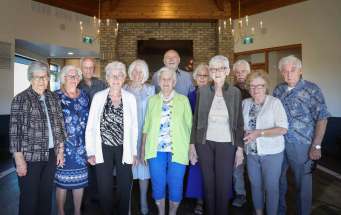Broadcaster ready to roll on historic day Programming to reflect legacy of residential schools slated for Sept. 30
Read this article for free:
or
Already have an account? Log in here »
To continue reading, please subscribe:
Monthly Digital Subscription
$1 per week for 24 weeks*
- Enjoy unlimited reading on winnipegfreepress.com
- Read the E-Edition, our digital replica newspaper
- Access News Break, our award-winning app
- Play interactive puzzles
*Billed as $4 plus GST every four weeks. Offer only available to new and qualified returning subscribers. Cancel any time.
Read unlimited articles for free today:
or
Already have an account? Log in here »
Hey there, time traveller!
This article was published 28/09/2021 (1253 days ago), so information in it may no longer be current.
The Aboriginal Peoples Television Network has had a scant four months to prepare for the makings of a landmark day for the 22-year-old Winnipeg-based channel.
Bill C-5 received royal assent on June 5, making way for National Day for Truth and Reconciliation to be a federal statutory holiday on Sept. 30.
CBC Manitoba special
Among the Crown broadcaster’s shows that will mark the National Day for Truth and Reconciliation is a new special from CBC Manitoba that airs Thursday at 9 p.m. on CBC.
We Know the Truth: Stories to Inspire Reconciliation will introduce people who are creating change in the way residential-school history is presented across Canada as well as interviewing others who strive to keep Indigenous languages and cultures alive.
It also fired the starter’s pistol on a sprint for APTN staff to provide a day’s worth of programming on Thursday that is worthy of the historic occasion.
Creative teams were sent across Canada to visit and document reactions to the day, schedulers had to make room for a whole day’s worth of programming and reschedule regular shows and APTN renegotiated deals with distributors to move up broadcast dates of feature films and documentaries on residential schools that would fit with the day’s programming.
“In the television world, where program content, from development to appearing on the air can take years, this is not a lot of time for us, but we feel it’s the right thing to do and APTN wants to provide the right content on the day,” says Mike Omelus, the channel’s executive director for content and strategy.
“I know the whole team has poured their heart into doing what we can to honour this day. This is as big as it gets for the country’s first national Indigenous broadcaster and we feel it’s a responsibility to have programming that educates, that informs and provides the kind of context that reconciliation requires.”
APTN’s day begins at 6 a.m. with APTN Sunrise Ceremony, which has had the channel’s videographers travelling to Indigenous communities across Canada to record prayers and remembrances and of the historic day.
Reconciliation and Me (11 a.m.) is a new APTN special that has Anishinaabe broadcaster and activist Sarain Fox visiting five youngsters from non-Indigenous families who pass on what they’ve learned about what reconciliation means.
Investigates: A Tragic Legacy (6:30 p.m.) has APTN reporter Kathleen Martens investigating the Indian Residential Schools Settlement Agreement, the class-action lawsuit that sparked the formation of the Truth and Reconciliation Commission of Canada and, eventually, the National Day for Truth and Reconciliation.
The centrepiece of the day’s programming will be a live commercial-free special produced by the National Centre for Truth and Reconciliation, APTN, CBC and Radio-Canada (8 p.m.) that will offer interviews about residential schools and the history between Indigenous and non-Indigenous Canadians, as well as music tributes to the day from artists from across Canada.
Among the documentaries on tap are the 2016 film We Can’t Make the Same Mistake Twice (7 a.m.), which is about the unequal funding of services for Indigenous children; nîpawistamâsowin: We Will Stand Up (2 p.m.), the 2017 film that revisits the killing of Colten Boushie and his family’s search for justice and a rebroadcast of We Were Children, a 2012 NFB doc (noon).
“We helped bring it to life back then but we wanted to have it on the schedule again because it’s profound and it tells about the impact of the residential-school system through the eyes of two children who were really forced to face incredible hardships beyond their years,” Omelus says.
Among the feature films is 2017’s Indian Horse (9 p.m.), which follows the life of Saul Indian Horse, who survives residential schools and racism of the 1970s by turning to his love of hockey. It’s based on the novel by Ojibwa author Richard Wagamese, and the film’s promotion was bolstered when Oscar-winning director and actor Clint Eastwood joined the project as executive producer.
APTN will provide reminders of the Truth and Reconciliation Commission of Canada’s 94 calls to action throughout the day, and orange will be a key colour in its branding to recognize Orange Shirt Day, the day’s original name that signified the awareness of Canada’s residential-school history, Omelus says.
“When you look at the channel on the day, you will know something different is happening.”
alan.small@freepress.mb.ca
Twitter:@AlanDSmall

Alan Small
Reporter
Alan Small has been a journalist at the Free Press for more than 22 years in a variety of roles, the latest being a reporter in the Arts and Life section.
Our newsroom depends on a growing audience of readers to power our journalism. If you are not a paid reader, please consider becoming a subscriber.
Our newsroom depends on its audience of readers to power our journalism. Thank you for your support.





